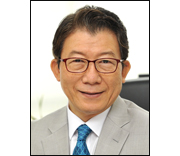-
[January 26. 2016 Korea times] FDI grievance by FX volatility
- Date : 2016.03.10
- Views : 421
FDI grievance by FX volatility
 |
By Jeffrey I. Kim
Globalized and connected as the world is today, changes in foreign exchange rates keenly affect the economic life of all nations. Traditionally, commodity trade was the major influence on exchange rates. These days, however, cross-border capital movements affect the exchange rates more strongly. Of capital movements, short-term speculative capital movement adds greater volatility to exchange rate. In addition, the expectation of future monetary policy concerning changing the money supply and increasing the interest rate immediately affect the current exchange rate.
Such exchange rate volatility is particularly critical for countries with non-reserve currencies. The value of a non-reserve currency is determined in a two-step manner. Once the new exchange rates between two reserve currencies are established in the global currency markets, the exchange rates of the non-reserve currencies are determined by the conditions of supply and demand in the local currency markets.
According to the present international monetary order, reserve currency countries can make a massive supply of their currency to stimulate the domestic economy by a policy named ‘quantitative easing.' They can do this with little risk of inflation because their currency is readily globally accepted. Consequently, the US, Europe, and Japan have not only distorted international currency markets but also greatly increased exchange rate risk and uncertainties.
That said, foreign investors have also come to face greater business risks. Wild fluctuations of the exchange rates make the dollar value of the profits they send back home unpredictable. As for foreign-invested companies, a large proportion of them are small-sized and they get the same benefits that the Korean SMEs receive from the government.
There are compelling reasons why the Korean SMEs receive special benefits from the government. In Korea, SMEs make up 99.9% of all businesses and employ 87.7% of labor. Compared to large businesses, there are limits for SMEs to grow and develop through their own efforts. In order to help them survive, the government carries out various support policies for SMEs through a government organization, SMBA (Small and Medium Business Administration).
To protect SME's business areas from reckless business expansion by large companies, the Korea Commission for Corporate Partnership designates the business types suitable for SMEs and bans large corporations from expanding into such businesses for a certain period. In the same spirit, a small-size affiliated corporate firm of a large company can officially be considered an SME if the total assets of its parent company are less than KRW 500 billion.
Foreign-invested companies can also get this benefit if they are officially classified as an SME by SMBA. If the total assets of the foreign parent company are less than KRW 500 billion, its affiliated company operating in Korea is categorized as an SME. But if the foreign parent company holds a 30% -100% share of a company in Korea and its total assets are more than KRW 500 billion, the foreign-invested company cannot be classified as an SME. So the investor can no longer enjoy this benefit.
Until last year, these businesses had faced unpredictability in SMBA's classification of business types due to exchange rate volatility. They have been included in or excluded from the scope of SMEs despite no change in the total assets of their parent companies. The foreign firms had to dance around the border. When the Korean currency value falls below a critical level, the foreign firms cannot receive the benefit in the following year. This was because all the assets of the foreign company were evaluated in the local currency. Moreover, the foreign investors used to be unhappy about the SMBA insisting on evaluating the assets of their parent companies. But this grievance disappeared when they realized that Korea complied with the national treatment principle.
Based on this principle, Korea grants to the foreign SMEs the same benefit that the local SMEs receive from the government. National treatment is an integral part of many World Trade Organization agreements. Having listened to the foreign investors' appeals through the Office of the Foreign Investment Ombudsman, the government had revised the enforcement decree of the Framework Act on SMEs and made this effective from 2015. With this revision, a five-year average exchange rate is applied instead of one year average.
Jeffrey I. Kim is a foreign investment ombudsman, a presidentially appointed troubleshooter for investors and entrepreneurs from overseas. He earned a Ph.D. in economics at the University of Chicago and taught at the University of Colorado, Boulder, and Sungkyunkwan University.
Link : http://www.koreatimes.co.kr/www/news/opinon/2016/02/198_196300.html










